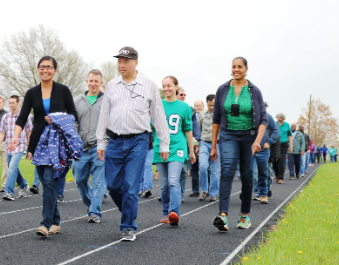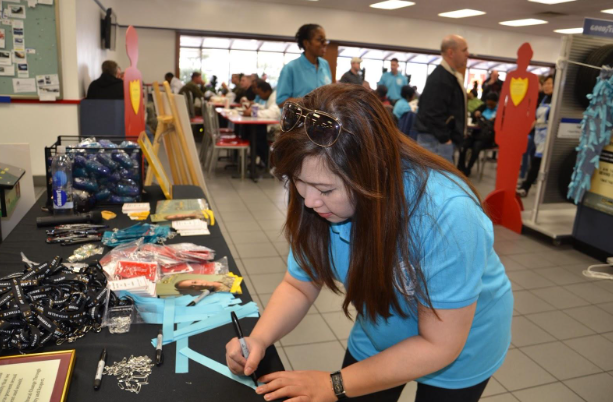Denim Day and It’s Impact on Society Nearly 30 Years Later
Image by Melissa Wetherbee
Denim Day supporter is shown writing the name of a sexual assault victim on a blue ribbon. The blue ribbon symbolizes sexual assault victims. While the teal ribbon symbolizes child abuse victims.
Warning: The following article contains mentions of sexual assault and rape. Viewer discretion is advised.
Denim Day is a campaign to honor survivors of sexual assault, educate others about sexual violence, and bring awareness to the misconceptions about sexual assault. The campaign is hosted on the last Wednesday of April in honor of Sexual Assault Awareness Month.
Denim Day stemmed from an Italian Supreme Court Case in the 1990s. An 18-year-old woman went out for a driving lesson with her 45-year-old instructor. The instructor took her to an isolated location, removed her from the vehicle, and forcefully raped her.
The victim returned home and informed her parents about her rape; her family supported her and pressed charges. The assailant was then arrested and convicted of rape.
One year after his sentencing, the assailant appealed the court’s decision. The case made its way up to the Italian Supreme Court and was overturned in days. The Chief Judge argued that his appeal was overruled due to the “jean alibi” or the “denim defense.”
On the day of the victim’s rape, she was wearing tight jeans. The assailant could not take off her jeans, forcing the victim to take them off. During the trial, the justices felt that taking off her jeans was the victim’s way of giving consent.
In retaliation, women in the Italian Parliament started protesting the verdict. The next day they wore jeans and stood on the steps leading up to the Supreme Court.

Word of the protest made international news. The Italian protest inspired many others to do the same. In California, senate and assembly members took to the steps of the Capitol in Sacramento. Executive Director of Peace Over Violence, Patti Occhiuzzo Giggans, stated that everyone should wear jeans in protest and support those who have been raped and sexually assaulted. Denim Day was then acknowledged and celebrated by the Peace Over Violence organization in L.A. The first Denim Day event was held in April of 1999.
As each year passes, more people are educated about sexual assault, but there are still more victims than ever. In the U.S., sexual assault happens every 68 seconds. Every year more than 400,000 sexual assault cases are reported; approximately 60,000 are children, 18,900 are military personnel, and 80,600 are inmates.
One in six women have been victims of attempted or successful rape, and one in 33 men are victims. Victims of sexual assault and rape tend to suffer from depression, PTSD, abuse of alcohol and drugs, and can become suicidal. Child victims are three to four times more likely to experience these long-lasting effects.
The issue with many of these sexual assault or rape cases is that society victim-blames. . According to the Sexual Assault Centre of Edmonton (SACE), victim-blaming can be defined as, “Someone saying, implying, or treating a person who has experienced harmful or abusive behaviour (eg: a survivor of sexual violence) like it was a result of something they did or said, instead of placing the responsibility where it belongs: on the person who harmed them.”
Victim-blaming discourages the victims from coming forward and reporting their assailants, but it also takes the focus off of their assailants. According to Harvard Law School, victim-blaming is one of the reasons that sexual assault is not reported.
Comments such as, “Well, what were they [the victim] wearing? They must have been asking for it.” Or, “Why did they get so drunk? They should have known something was going to happen” are examples of common victim-blaming in society.
So the question we must now ask is:
What can we do to work against victim-blaming?
One way is making sure that the victim’s voices can be heard and confront those who silence victims. We should confront those who victim-blame and let victims know that it is not their fault. Victims should not feel the need to condone their assailant’s actions because of alcohol and drugs.
To learn more information about Denim Day, please go to denimdayinfo.org.
If you or someone you know is or has experienced relationship violence, sexual violence, or any other type of interpersonal violence, please see the resources below.
24/7 LA Rape & Battering Hotline: 626.793.3385 | 310.392.8381 | 213.626.3393
RAINN’s National Sexual Assault Hotline: 800-656-HOPE (4673)
Suicide Prevention Hotline: 1-800-273-8255, in July 2022 the number will be changed to 988.
References:
Why Denim? (n.d.). Denim Day Info. Retrieved April 28, 2022, from https://www.denimdayinfo.org/why-denim
History of Denim Day. (n.d.). Uwosh.Edu. Retrieved April 28, 2022, from https://www.uwosh.edu/care/denim-day/history-of-denim-day
Your donation will support the student journalists of Mt. SAC Early College Academy. Your contribution will allow us to purchase equipment and cover our annual website hosting costs.

Annika Wotherspoon is a current senior at Mt. SAC ECA and is currently in her fourth year on the TAC staff. She is most excited to work on informative...







